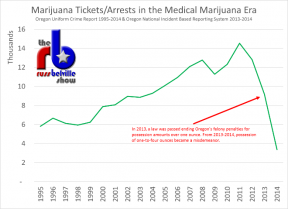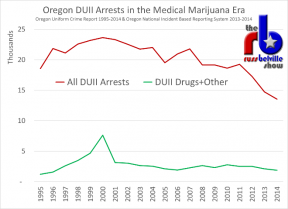Project SAM Still Thinks the Sky Will Fall
July 1 marked the first anniversary of marijuana legalization here in Oregon. Or as the prohibitionists call it, “the apocalypse”.
The results after one year have been phenomenal. Oregon’s registered about $15 million in tax revenue. New jobs have been created and business is flourishing. Teens aren’t smoking pot any more than they were before, but adults are taking it up, especially those over 50. And at least 500 people have had their previous criminal records expunged, opening up many new opportunities in their lives.
But to the prohibitionists with Project SAM, legalization has created a terrifying new reality – one where they will soon be out of a job. Now that marijuana has been legalized in four states and Washington DC, they are increasingly desperate to find new ways to scare the public about pot. Already, the head of Oregon’s chapter of Project SAM, a Portland man named Randy Philbrick, has lost his advocacy position after comparing the social harm of marijuana legalization to the horrific massacre in Orlando.
Oregon NORML had posted an article about how the sky didn’t fall in Oregon. It was soon commented on by Philbrick, who was joined by Scott Gagnon, the still-head of Project SAM in Maine. It is in their replies that you can find the new talking points you’ll hear in attack ads against legalization this fall in California, Nevada, and Maine, which are voting on legalization this November.
Oregon’s (former) SAM, Randy Philbrick: “Oregon didn’t punish everyday users before. Most who got fined for possession were stopped for other crimes.”
 Randy must live in a world where a fine, loss of driver’s license, and confiscation of personal property by law enforcement is not a “punishment”. Apparently, since he lives in a world where pretext roadside stops and smelling like marijuana are “crimes”.
Randy must live in a world where a fine, loss of driver’s license, and confiscation of personal property by law enforcement is not a “punishment”. Apparently, since he lives in a world where pretext roadside stops and smelling like marijuana are “crimes”.
Also, where did everyday users get their marijuana? From everyday sellers and everyday growers, who were still quite punished in Oregon. Sellers and growers who were unregulated and paid no taxes.
By 2011, Oregon was punishing over 14,500 people for marijuana offenses annually, with over 12,000 of those being punishments for possession for personal use.
RP: “What I would prefer is science based education to keep kids from using ALL drugs.”
Sounds good! Like the science that shows marijuana consumers have less head, neck, and lung cancer, less diabetes and lower body-mass index, protection against the plaques that form in Alzheimer’s, no long-term declines in IQ, and no statistical difference in auto crash risk, as well as the science showing declines in opioid overdose and suicide correlating with access to marijuana. Instead of the eggs in frying pans, talking dogs, flat stoners, cartoon aliens, and trying to convince kids that marijuana will Destroy! Their! Brains!
RP: “As for the police spending more time in other crimes… I’m sure they’re spending more time on marijuana now with the rise in DUIs, illegal grows and other issues.”
 There has been no massive increase in DUIs in Oregon. Since the passage of our medical marijuana law in 1998, we have seen a decline in overall DUI arrests from over 23,000 to under 14,000. Those DUIs attributable to drugs or undetermined causes have declined from over 4,500 to under 2,000. (Oregon doesn’t yet break out its DUI data by what type of drug.)
There has been no massive increase in DUIs in Oregon. Since the passage of our medical marijuana law in 1998, we have seen a decline in overall DUI arrests from over 23,000 to under 14,000. Those DUIs attributable to drugs or undetermined causes have declined from over 4,500 to under 2,000. (Oregon doesn’t yet break out its DUI data by what type of drug.)
Now there has been an increase in traffic fatalities over the past two years. We’re over 400 in 2015, an increase from 313 in 2013, which was the lowest recorded traffic death toll in fifty years. But that’s mirroring a nationwide trend in traffic fatalities attributable to lower gas prices that lead to more miles driven, raised speed limits in rural areas, plus the increase in distracted driving thanks to smartphones.
Scott Gagnon, Project SAM Maine: “The revenues are a drop in the bucket compared to overall state budgets…”
However much the legal marijuana market is contributing to the bucket is infinitely more than the black market was contributing to the bucket.
SG: “You guys conveniently don’t set up the data tracking to measure and tabulate the costs. And while you guys might laugh off someone going to the ER for an overdose … the bill that comes back to the family is significant.”
And the prohibition side conveniently never tabulates the costs to a cannabis grower who’s busted when weed is illegal, from the direct costs of fines, court costs, probation costs, parole costs, restitution, and lawyer’s fees to the indirect costs of driver’s license loss, job loss, child custody loss, and so forth. Plus, a visit to the ER doesn’t come with a lifetime criminal record.
When Kevin Sabet was starting with Project SAM back in 2013, he used to warn that for every dollar alcohol and tobacco bring in, they cost ten times than in social costs. Yet since legalization has reaped over $200 million in tax revenue, he has yet to tabulate his implied $2 billion in marijuana’s social costs.
The problem of marijuana edible overconsumption is a serious one – I’ve experienced it and it is not pleasant. That’s why we’ve recognized the need for lower-potency products and clear labeling and education about their use. But if Randy or Scott can even show a push – fifteen million dollars in Oregon ER costs from marijuana overdoses – I’d be shocked.
SG: “The pot shop that push [sic] the edibles to ensnare new users doesn’t have to worry about [the costs]… The marketing for something like ‘Rookie Cookie’ is pretty clear. Beginners = new users.
Well, now we’re damned if we do and damned if we don’t. Make pot-infused cookies and they’re going to complain about over-consumption. Make lower-potency cookies to address over-consumption and they’re going to complain about enticing new consumers.
There is no logical debate to be had with prohibitionists because they aren’t fighting for sound public policy based on public health. If they were, they’d be crusading against alcohol, cigarettes, fast food, and a dozen other things far more harmful than marijuana. Every government that has ever studied the issue (including Nixon’s) has concluded that marijuana should at least be decriminalized. The experiments thus far in four states and DC have proven the prohibitionists’ most fearful predictions to be bunk.
No matter how loudly Project SAM screams about it, the sky still has not fallen in legal marijuana states.






